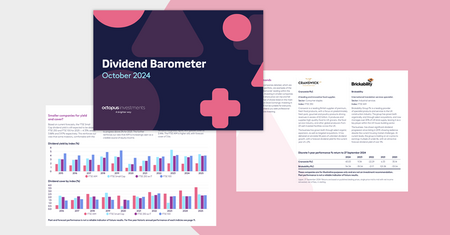Guide
Guide to Consumer Duty and tax-efficient investments
Experts from PFS, Bankhall, and Hardman & Co. talk Consumer Duty regulation and how you can deliver the best client outcomes
Consumer Duty and tax-efficient investments



Consumer Duty places focus on delivering good customer outcomes.
Advisers must have robust processes, evidence fair price and value, and demonstrate how they are helping clients achieve their objectives.
So how can you ensure good outcomes for clients? What should you be considering when assessing price and value? And how do tax efficient investments support you and your clients under Consumer Duty?
To help you build a strong business that delivers for clients, whilst considering Consumer Duty, we engaged with some of the industry’s foremost experts.
The Personal Finance Society (PFS), Bankhall, and Hardman & Co. have shared their insights and practical tips, which you will find in this guide. They want to help financial advisers understand what they should consider when it comes to price and value and good customer outcomes.
And that includes understanding how tax-efficient investments might play a role in helping suitable clients.
The consumer duty triangle
The ‘Consumer Duty’ framework triangle is structured with the Consumer Principle at the top of the triangle which states that ‘A firm must act to deliver good outcomes for retail customers.
Below this section of the triangle are the three ‘cross-cutting’ rules:
1. Act in good faith towards retail consumers.
2. Avoid foreseeable harm to retail customers.
3. Enable and support retail customers to pursue their financial objectives.
At the base of the triangle, The Consumer Duty also outlines four key outcomes:
1. Product and services.
2. Price and value.
3. Consumer understanding.
4. Consumer support.
Each of these are key elements of a firm’s client relationship, and are of course important in driving good customer outcomes.
Personal opinions may change and should not be seen as advice or recommendation.
Tax-efficient investments are not suitable for everyone. Any recommendation should be based on a holistic review of a client’s financial situation, objectives, and needs.
This guide does not constitute advice on investments, legal matters, taxation, or any other matters.
Interviews with leading experts
Interviews with leading experts
How you can build a robust business under Consumer Duty, and how tax-efficient investments might support you.
Delivering good client outcomes
- Tax-efficient investments and good client outcomes.
- Targeting returns with venture capital while managing portfolio risk.
Price and value
- The added value of tax planning.
- How enhanced research and due diligence requirements impact price and value.
- Documenting price and value considerations.
Avoiding foreseeable harm
- What you must consider in helping clients avoid foreseeable harm.
- The importance of estate planning and engaging a client’s beneficiaries.
Interview with Personal Finance Society (PFS)
The Personal Finance Society is the leading professional body for financial planners. It is dedicated to building trust in the profession and has developed a new planning approach to help advisers comply with Consumer Duty.
Dr Matthew Connell is Director of Policy and Public Affairs at PFS.
“Consumer Duty puts emphasis on showing the value that you’re delivering. And tax-efficient investments can add significant value to a client’s financial planning”
Dr Matthew Connell
Interview with Bankhall
Bankhall provides specialist support for compliance, regulatory, and business challenges. They make it easier for you to focus on providing the best service to clients. They offer Consumer Duty consultations for businesses.
John Higginbottom is Head of Regulatory Propositions at Bankhall.
Linda Preston-Todd is Client Relationship Director at Bankhall.
“The price of any financial advice should be appropriate to the cost of delivery. Tax-efficient investments have increased research, time, due diligence and specialist knowledge requirements.”
Linda Preston-Todd – Client Relationship Director at Bankhall.
Interview with Hardman & Co.
Hardman & Co is an innovative corporate research and consultancy based in London. Its team of sector analysts and market professionals collectively have over 400 years of experience.
Dr Brian Moretta is Head of Tax-Enhanced Research at Hardman & Co. He’s an experienced researcher of products and strategies in venture capital.
“Consumer Duty obliges you to get the best outcome for your clients. I believe you should consider adding venture capital to client portfolios as it can lead to better outcomes.”
Dr Brian Moretta – Head of Tax-Enhanced Research at Hardman & Co.
Important risks to consider
The value of an investment, and any income from it, can fall as well as rise. Investors may not get back the full amount they invest.
Tax treatment depends on individual circumstances and tax rules may change in the future.
Tax relief depends on portfolio companies or the VCT maintaining their qualifying status.
VCT shares and the shares of smaller and unquoted companies are by their nature high risk, their share price may be volatile and they may be hard to sell.
Three key steps when recommending tax-efficient investments
Three key steps when recommending tax-efficient investments
PFS, Bankhall, and Hardman & Co. suggest you take these three steps to meet your obligations under Consumer Duty when recommending tax-efficient investments.
Build your knowledge
To understand whether your existing or future clients are suitable, it’s critical to understand tax-efficient investments.
Dr Brian Moretta of Hardman & Co. explains: “The first step, particularly if you’re not used to recommending these investments, is to educate yourself. You need to understand the benefits and the risks of tax-efficient investments and venture capital. Then you’ll be able to see where tax-efficient investments can deliver value and good customer outcomes.”
Learn more about tax-efficient investments
Review your client bank
Tax-efficient investments could help you achieve better outcomes for a range of suitable clients.
John Higginbottom of Bankhall says, “It’s important to review your client bank to see where tax-efficient investments could deliver value and good outcomes.”
Client planning scenarios are a great tool for exploring how these investments could support your clients.
View our client planning scenarios
Evidence price, fair value, and good customer outcomes
It’s best practice to document price and value considerations and how good outcomes are being delivered.
“You’ve got to think about the commercial costs of providing additional value,” explains Dr Matthew Connell of PFS. That might be the enhanced due diligence requirements, the additional work needed to ensure a high-risk investment is suitable, or the time needed to maintain specialist knowledge.”
To help you with this, Octopus has created product packs which provide an enhanced level of information to ensure your case files meet the standard required by the regulator.
Supporting your research and due diligence
Supporting your research and due diligence
Our product packs provide an enhanced level of information to help your client’s case file meet the needs of the latest regulation.
Each pack includes:
- How Octopus prioritises good outcomes for customers.
- An assessment of the investment against the four outcomes of Consumer Duty.
- Key technical information, including fees.





